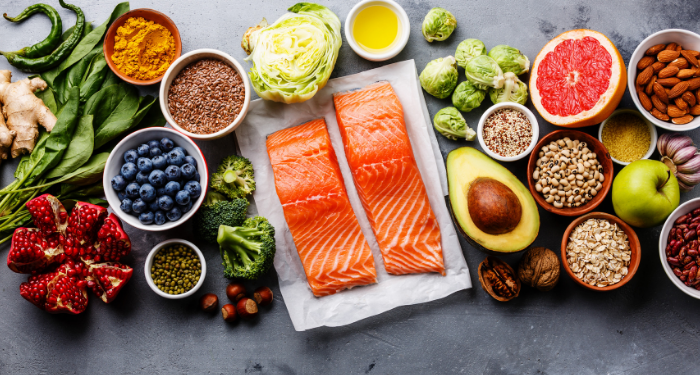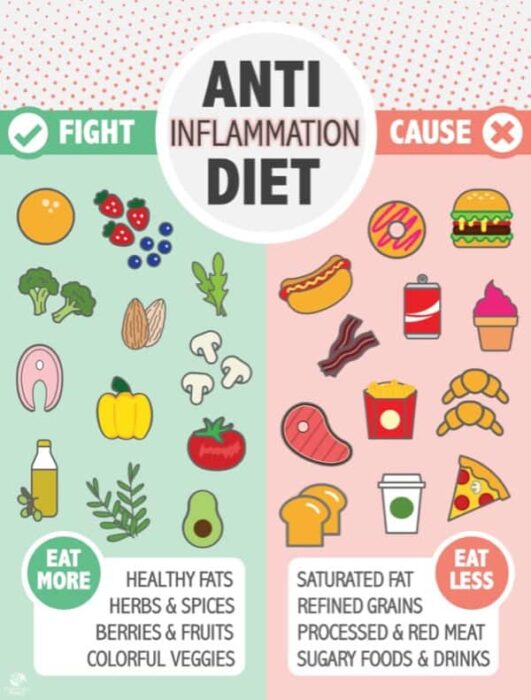
Understanding Inflammation: A Brief Overview
Inflammation is a natural protective response initiated by the body as a defense mechanism against harmful stimuli. It is a complex biological process that involves the immune system’s response to injury, infection, or irritation. When the body detects any potential threat, it releases chemicals that promote blood flow to the affected area, causing redness, swelling, and warmth.
Acute inflammation is a short-term response that aids in healing and is crucial for our well-being. However, chronic inflammation is a different story. Prolonged inflammation can lead to a range of health complications, including heart disease, diabetes, arthritis, and even cancer. It is essential to understand the underlying causes of inflammation to effectively manage and reduce its impact on our health.
The Role of Diet in Managing Inflammation
When it comes to managing inflammation, diet plays a crucial role in either exacerbating or alleviating symptoms. Certain foods can trigger an inflammatory response in the body, while others possess powerful anti-inflammatory properties. Incorporating a well-balanced, nutrient-rich diet is key to reducing inflammation and promoting overall health.
One of the most important factors to consider in an anti-inflammatory diet is the inclusion of fruits and vegetables. These plant-based foods are rich in antioxidants, vitamins, minerals, and phytochemicals, all of which help combat inflammation. Berries, in particular, stand out as nature’s anti-inflammatory powerhouses. Packed with antioxidants called anthocyanins, berries have been shown to reduce inflammation markers in the body and protect against chronic diseases. Incorporating a variety of colorful fruits and vegetables into your diet ensures a diverse range of anti-inflammatory nutrients that work synergistically to combat inflammation.
1. Berries: Nature’s Anti-Inflammatory Powerhouses
Berries are not just delicious and colorful additions to your meals; they also possess remarkable anti-inflammatory properties. Packed with antioxidants, vitamins, and minerals, berries help reduce inflammation and promote overall health. Their vibrant hues come from the presence of phytochemicals, such as flavonoids and anthocyanins, which have been found to combat inflammation and protect against chronic diseases.
Among the various types of berries, studies have shown that blueberries, strawberries, and raspberries are particularly potent in fighting inflammation. Blueberries, in particular, have been praised for their high levels of antioxidants, including quercetin and resveratrol, which alleviate inflammation by neutralizing oxidative stress. Strawberries, on the other hand, contain a compound called ellagic acid, which has been shown to reduce inflammation and inhibit the production of inflammatory molecules. Raspberries, with their rich fiber content, not only aid in digestion but also help regulate the immune response, reducing inflammation in the body.
2. Incorporating Leafy Greens for Their Anti-Inflammatory Benefits
Leafy greens, such as kale, spinach, and collard greens, are not only delicious but also provide numerous health benefits. When it comes to managing inflammation, these vibrant vegetables play a crucial role. Packed with vitamins, minerals, and antioxidants, leafy greens offer a natural and effective way to reduce inflammation in the body.
One key nutrient found in leafy greens is vitamin K. This essential vitamin has been shown to possess anti-inflammatory properties, helping to regulate the body’s inflammatory response. Additionally, leafy greens contain high levels of antioxidants, such as vitamin C and beta-carotene, which can help combat inflammation by neutralizing harmful free radicals. Including a variety of leafy greens in your diet can provide the necessary arsenal of nutrients to keep inflammation at bay and promote overall well-being.
3. The Healing Power of Turmeric and Ginger
Turmeric and ginger are two powerful spices that have been used for centuries in traditional medicine for their healing properties. Turmeric contains a compound called curcumin, which has potent anti-inflammatory and antioxidant effects. Studies have shown that curcumin can help reduce inflammation in the body and alleviate symptoms of conditions like arthritis and inflammatory bowel disease. Ginger, on the other hand, contains gingerol, a bioactive compound with anti-inflammatory and analgesic properties. Regular consumption of ginger has been found to reduce muscle pain, relieve migraines, and decrease inflammation markers in the body.
Both turmeric and ginger can be easily incorporated into your daily diet. Turmeric can be added to curries, smoothies, or even brewed as a soothing tea. Ginger can be used in cooking, juiced, or steeped in hot water for a comforting drink. To enhance the absorption of the beneficial compounds in turmeric, it is recommended to consume it with black pepper or a source of fat, like coconut oil. Remember to consult with your healthcare provider before adding turmeric or ginger to your regimen, especially if you are taking any medications or have underlying health conditions.
4. Nuts and Seeds: Tiny Packages of Anti-Inflammatory Goodness
Nuts and seeds are not only delicious and convenient snacks, but they also pack a powerful punch when it comes to reducing inflammation in the body. These tiny packages of goodness are rich in omega-3 fatty acids, antioxidants, and fiber, which have been shown to have anti-inflammatory effects. Studies have shown that incorporating nuts and seeds into your diet can decrease levels of inflammatory markers such as C-reactive protein (CRP) and interleukin-6 (IL-6).
Almonds, walnuts, flaxseeds, and chia seeds are just a few examples of nuts and seeds that can help fight inflammation. These nutritional powerhouses contain compounds like alpha-linolenic acid (ALA) and lignans, which have been found to reduce inflammation in various chronic conditions such as heart disease, diabetes, and arthritis. Additionally, their high fiber content helps promote a healthy gut microbiome, which plays a significant role in modulating inflammation in the body.
5. Healthy Fats: Avocado, Olive Oil, and Fish for Inflammation Reduction
Healthy fats play a crucial role in reducing inflammation within the body. Avocado, known for its creamy texture and mild taste, is a nutrient-dense fruit that is rich in monounsaturated fats, which have been shown to have anti-inflammatory effects. These healthy fats help to lower levels of certain inflammatory markers in the body, supporting overall health and well-being. Incorporating avocados into your diet can be as simple as adding slices to salads, spreading mashed avocado on toast, or blending it into smoothies for a creamy texture.
Another beneficial fat to include in an anti-inflammatory diet is olive oil. This kitchen staple is not only delicious but also contains high levels of monounsaturated fats, particularly omega-9 fatty acids. These fats have been shown to have anti-inflammatory properties, supporting heart health and overall well-being. Using olive oil in cooking, drizzling it over salads, or using it as a dip for bread are all easy and tasty ways to incorporate this healthy fat into your meals.
6. Cruciferous Vegetables: An Essential Addition to Your Anti-Inflammatory Diet
Cruciferous vegetables, such as broccoli, cabbage, cauliflower, and Brussels sprouts, are not only delicious additions to your meals but also vital for maintaining a healthy inflammatory response in the body. Packed with essential nutrients, these vegetables offer a wide range of benefits for your overall well-being.
One key component found in cruciferous vegetables is sulforaphane. This powerful compound has been shown to have anti-inflammatory properties, helping to reduce the levels of inflammatory markers in the body. Additionally, cruciferous vegetables are rich in antioxidants, vitamins, and minerals, all of which play a crucial role in supporting a healthy immune system and fighting oxidative stress. Incorporating these veggies into your daily diet can help to reduce inflammation and promote optimal health.
In conclusion, cruciferous vegetables are a must-addition to your anti-inflammatory diet. Their abundance of nutrients and anti-inflammatory compounds can help to combat inflammation and support overall well-being. By incorporating these veggies into your meals, you can take a proactive approach in managing inflammation and nurturing a healthier body.
7. Colorful Fruits for Their Anti-Inflammatory Properties
Fruits are not only delicious but also offer a host of health benefits, including their anti-inflammatory properties. Colorful fruits, in particular, contain phytochemicals that can help reduce inflammation in the body. These phytochemicals, such as anthocyanins found in berries and lycopene in tomatoes, have been shown to have anti-inflammatory effects. Incorporating a variety of colorful fruits into your diet can provide a wide range of these beneficial compounds, helping to combat inflammation and promote overall health.
In addition to their anti-inflammatory properties, colorful fruits are also rich in essential vitamins, minerals, and antioxidants. These nutrients help support the immune system and protect against oxidative stress, which can contribute to inflammation. For example, citrus fruits like oranges and grapefruits are high in vitamin C, known for its immune-boosting properties. Similarly, tropical fruits like pineapple and papaya contain bromelain and papain enzymes, respectively, which have been shown to have anti-inflammatory effects. By incorporating a rainbow of fruits into your diet, you can not only satisfy your taste buds but also reap the many health benefits they offer, including their ability to reduce inflammation.
8. Whole Grains and Legumes: Nutritional Powerhouses for Fighting Inflammation
Whole grains and legumes are often underestimated when it comes to their potential role in fighting inflammation. These nutritional powerhouses are packed with essential vitamins, minerals, fiber, and antioxidants that can help reduce inflammatory markers in the body. Whole grains such as oats, quinoa, and brown rice are rich in fiber, which aids in digestion and helps stabilize blood sugar levels. Legumes like lentils, chickpeas, and black beans provide a great source of plant-based protein and are also high in fiber. Incorporating these foods into your diet can not only support overall health but also contribute to the management of inflammation-related conditions.
In addition to their nutrient density, whole grains and legumes contain phytochemicals that possess anti-inflammatory properties. For example, quercetin, a flavonoid found in whole grains, has been shown to reduce the production of inflammatory chemicals in the body. Similarly, legumes contain compounds like isoflavones, which have anti-inflammatory effects. Including a variety of whole grains such as whole wheat, barley, and millet, along with legumes like lentils, chickpeas, and black beans, can provide a wide range of these beneficial compounds. Incorporating these nutritional powerhouses into your daily meals can contribute to an anti-inflammatory diet and potentially alleviate the symptoms associated with inflammation.
9. Dark Chocalate And Cocoa:
Indulging in a bar of dark chocolate isn’t just a heavenly experience for your taste buds—it’s like a treat for your body too! Beyond the blissful taste, dark chocolate is loaded with amazing stuff called antioxidants. These antioxidants are like little warriors, fighting inflammation and possibly keeping nasty diseases at bay, making you age like fine wine.
Ever wondered what gives chocolate this superpower against inflammation? It’s all thanks to flavanols, magical compounds found in cocoa. These flavanols are like the superheroes for the cells lining your arteries, ensuring they stay healthy and happy. Picture this: a small bunch of folks in a study tried this cocoa flavanol adventure. They had 852 mg of it twice a day, and guess what? Their blood vessels threw a little party! Blood pressure went down, and their arteries relaxed a bit, all within 3 to 8 hours after munching on some cocoa magic.
Of course, we need more of these studies to be absolutely sure. But for now, here’s the delightful advice—go for dark chocolate with at least 70% cocoa (more is merrier!) to soak in these anti-inflammatory perks. It’s like giving yourself a sweet health boost.
10. Mushrooms: The Anti-Inflammatory Superfood
Mushrooms are well-known for their exquisite flavour, but they also have a well-kept secret: they have anti-inflammatory properties. Their secret ingredient is a cocktail of bioactive substances known for their anti-inflammatory qualities, such as beta-glucans and ergosterol. These modest mushrooms also contain critical minerals such as selenium, potassium, and vitamin D, all of which contribute to their anti-inflammatory abilities.
According to research, eating mushrooms like shiitake, maitake, and reishi on a daily basis may decrease inflammatory indicators in the body, lowering the risk of chronic illnesses. Mushrooms not only add flavour to your dishes, but they also encourage a healthy, inflammation-free lifestyle. So, the next time you’re making a dinner, think about include a tasty and nutritious mushroom.



